Executive function and self-regulation are vital skills to develop in early childhood. Research shows that developing self-regulation skills in preschool can actually predict a child’s success and well-being throughout their entire lifetime. In preschool classrooms, 3- to 5-year-olds who practice self-regulation skills have fewer meltdowns—and find their calm more quickly when they’re upset. In this article, we’ll cover the brain science of self-regulation, and how early childhood teachers can help young children to reflect, manage, and express their big feelings without temper tantrums.
Ready to transform your classroom experience? Contact us for more information.
Let's get into it.
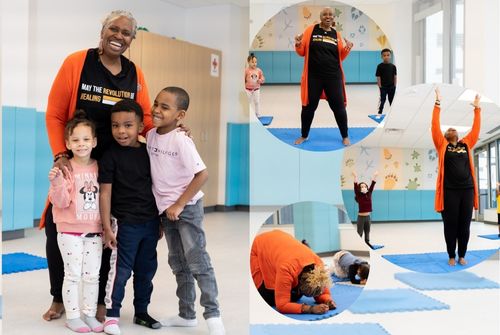
Preschool administrators are seeing increased behavioral challenges and developmental delays in children since COVID-19. At the same time, preschool teacher recruitment is down and turnover rates are up. If your ECE program has dysregulated children and stressed-out staff, you may be grappling with some of these questions:
If you are asking some of these questions, please hear us when we say this: You. Are. Not. Alone. We understand the obstacles you’re up against and how many challenges you’re trying to overcome. At EGG, we believe that insights from brain science can help you create more resilient classrooms for preschoolers and their teachers.
“They enjoyed EGG and they weren’t acting out or anything. They were patiently waiting, waiting for their names. And I think it makes them feel a sense of belonging in the classroom.” - Teacher testimonial
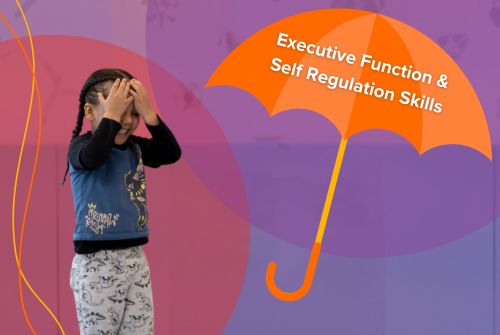
According to Harvard University’s Center on the Developing Child, executive function and self-regulation skills are “highly interrelated” umbrella skills that children (and adults!) use to regulate our thoughts, feelings, and behaviors.
These skills include the ability to:
Executive function and self-regulation form the building blocks of “focus” and “resilience,” key capacities for success in school and life. Every day, we rely on these capacities to help us contribute positively to school and work, as well as our communities, families, and other relationships. When children build executive function and self-regulation skills in early childhood, research shows greater outcomes across their lifetimes, including:
The benefits of focus and resilience begin as early as 3 to 5 years old. When young children learn how to share their thoughts, reflect on their behavior, and regulate their bodies, they experience fewer meltdowns and bounce back faster when they are upset. ECE teachers play a vital role in helping young children to develop these skills, at the critical stage when brain development is at both its fastest and most foundational.
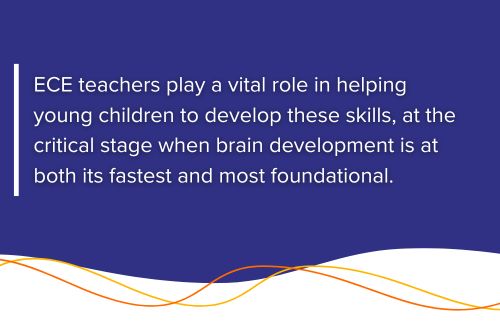
Below are a few humorous examples from parents on Reddit:
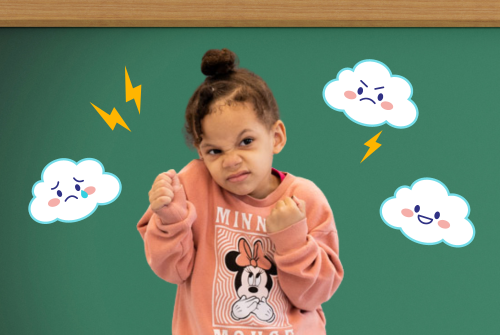
Thanks to brain science, we understand what happens on a physiological level during tantrums. When a child experiences a trigger—yes, even broken banana–a part of their brain called the “amygdala” detects a threat. In response, the hypothalamus in their brain releases a flood of stress hormones. Because young children’s brains are still growing the pre-frontal cortex, the primary part of the brain responsible for self-regulation, this stress response leads to the hallmark behaviors of a temper tantrum:
These are “fight-or-flight” responses that helped humans to survive for generations in the face of real threats to safety. Even though tantrums are unpleasant for adults and children alike, they have an important purpose. Emotional outbursts help young children to process their overwhelming feelings and find their way back to emotional balance.
According to The Center on the Developing Child, children are born with the “potential” to build self-regulation and executive-functions skills, but they need opportunities in order to practice and develop them. Research shows that these skills develop most rapidly between the ages of 3 and 5 years old, when the prefrontal cortex is primed for lessons on “working memory,” “mental flexibility,” and “self-control.”
Before children develop these cognitive abilities, many of their self-regulation processes are unconscious. Unconscious processes happen lightning-fast, often without thought ahead of time. Anyone working with preschoolers has seen how often young children act before they speak! Early on in a child’s development, behaviors associated with tantrums are part of these unconscious processes. ECE teachers can help young children build awareness and strategies for self-regulation that go beyond temper tantrums.
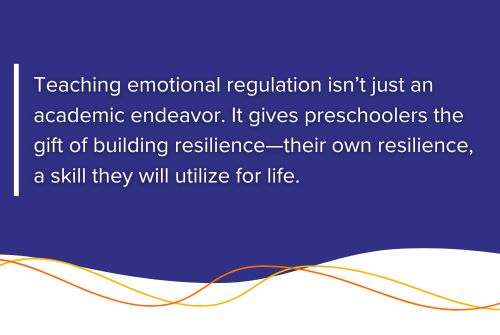
This is where EGG comes in. Preschool teachers use EGG Toolkit to provide fun, flexible, and science-backed activities proven to build self-regulation skills in 3- to 5-year-olds. EGG works in as little as 30minutes per day and utilizes three key components that form the “building blocks” of executive function and self-regulation:
Children learn through EGG activities how to share their thoughts and feelings, reflect on their behavior, and regulate their bodies. As a result, they experience fewer meltdowns and bounce back faster when feeling upset. Classrooms become more joyful and teachers feel more successful.
“The kids love the mindfulness activities with EGG. So we repeat those. We incorporate them before naptime, after naptime, before or after we go to the playground, or before we go home.” - Teacher testimonial
EGG Toolkit leverages the powerful stage of early childhood to help children 3 to 5 years old use their words. Consider this: according to speech pathologists Kenneth G. Shipley and Julie G. McAfee, the average 3-year-old recognizes about 1,000 words. By the time they turn 5 years old, they will recognize an average of 10,000 words!
EGG Toolkit gives children opportunities to learn internal state language that helps them to describe experiences of themselves, others, and the world around them. Children practice internal state language related to:
Researchers from The Center for Early Education and Development at the University of Minnesota (CEED) found that EGG demonstrated a statistically significant impact on emotional descriptive language, positive age-appropriate behavior, and personal narration—all highly correlated with executive function and self-regulation skills.
Example: "I'm hungry!” Or, “Teacher, I’m sad that he took my toy.”
EGG Toolkit gives children the opportunity to practice telling personal narratives (“Telling My Story”) and group narratives (“Telling Our Story”). According to Dr. Chris Wing, speech pathologist and EGG Toolkit curriculum developer, children use narrative skills for the following purposes:
As children’s narrative skills develop, the stories they tell will become more complex. Preschool teachers use EGG Toolkit to guide children’s development in these narrative skills:
Salt Software conducted a language sample analysis of this storytelling from preschoolers and found that the complexity of children’s narratives increased after using the EGG toolkit.
Examples: “Ms. Teresa told a funny story and everybody laughed. It was fun.” Or, “When she didn’t share with me, it made me feel bad, so I asked if we could play together.”
With support and structure, even three-year-olds can learn body-based skills for finding their calm! Repetition is a key part of nurturing successful mindfulness practices at any age, including early childhood. Over time, children build pathways in the brain that lead from “fight-or-flight” mode during tantrums back to a place of calm in their bodies.
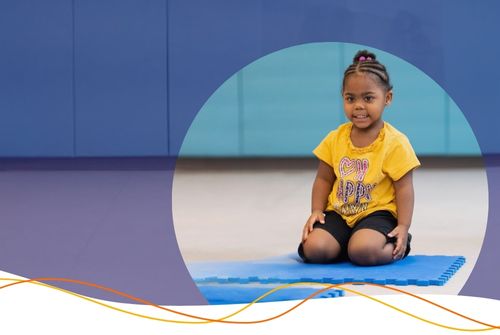
ECE educators use EGG Toolkit to introduce developmentally appropriate mindfulness practices in their classrooms, including:
The benefits of mindfulness practices go above and beyond reducing temper tantrums. Zero to Three identifies four capacities that young children can grow through mindfulness—skills associated with executive function:
EGG Toolkit is proven to help children across a wide spectrum of development. Results from the Minnesota Executive Functioning Scale (MEFS) app from Reflection Sciences showed that children who started below the age-adjusted median for executive function scored above the age-adjusted national median after using EGG.
And after participating in just nine EGG sessions, preschoolers showed a 10.4% decrease in child regulation problems based on the Child Executive Functioning Inventories (CHEXI) scale.
Example: When a child feels stressed, they take a deep breath instead of throwing a toy.
“With support and structure, even three-year-olds can learn body-based skills for finding their calm.” - Teacher testimonial
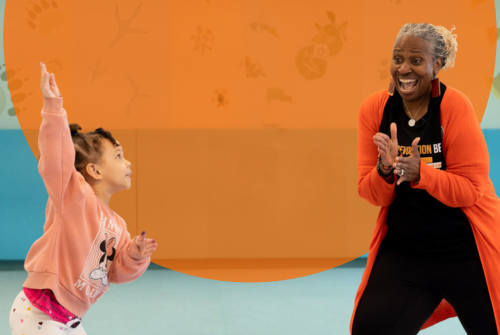
ECE administrators love EGG because they see the following positive results:
Research shows children's brains best develop with secure and responsive caregivers. EGG gives early childhood educators the tools they need to be responsive to students in a way they can rely on and feel secure in.
“They liked coming up and holding your hand and having like that special moment. They feel more present in the classroom because you said their names.” - Teacher testimonial
When asked how activities like the Goodbye Song help children build self-regulation skills, one teacher reported, "They liked coming up and holding your hand and having like that special moment. They feel more present in their classroom because you said their names."
Children and teachers experience support and structure through EGG that lowers the volume, literally and metaphorically, in preschool classrooms.
We know that preschool teachers are doing the most important job in the world—and EGG Toolkit is here to support you! We hope you’ll choose EGG and make the development of self-regulation a joyful part of your school year. EGG takes the heavy lift out of research, planning, and professional development, so it just feels like fun.
EGG takes the heavy lift out of research, planning, and professional development, so it just feels like fun.
Ready to bring EGG Toolkit to your classroom? Contact John Everett Till, EGG Enterprise Manager. For ongoing inspiration, you can sign up for our newsletter and follow EGG Toolkit on Facebook and Instagram.
Website Copyright © 2025 Family Partnership